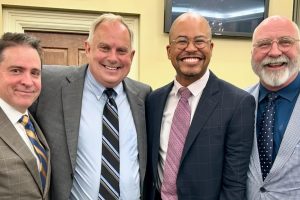It was the innocence of the twenty youngest victims of the Sandy Hook Elementary School shootings, all the ages of my son and his first-grade classmates, which made this latest mass shooting most enduringly haunting.
Their innocence also underscores the incapacities of the major approaches to theodicy for offering a satisfying resolution to the tension between Judeo-Christian affirmations of the goodness and omnipotence of God on the one hand and the ongoing existence of evil and suffering in God’s world on the other.
“Theodicy,” literally a “justification of God” in relation to the observation that all is not right with the present state of the world, is a philosophical legacy of the Enlightenment (Gottried Leibniz first employed the term in 1710). But the questions a theodicy seeks to answer are as old as humanity, for many ancient religions and philosophical systems represent attempts to answer them.
In antiquity and modernity, Christian thinkers have proposed various ways of relating what they affirm about the character of God to the sufferings that mark life in God’s world. Many in the Christian tradition have concurred with Augustine of Hippo (354-430), for whom humanity is to blame for the way things are: people use their God-given freedom to choose evil rather than good, and innocent people suffer as a result. Yet over two centuries earlier Irenaeus of Lyons (ca. 115-ca. 202) seemed to suggest that the possibility of suffering was part of God’s good creation from the beginning as necessary for helping people grow toward everything God intended humanity to be, a suggestion developed more fully in recent years by John Hick (1922-2012).
The Reformed tradition exemplified by John Calvin (1509-64) offered a twofold answer: God makes use of some instances of suffering to punish the wicked and discipline God’s people; in all instances God has a good purpose for suffering, but we cannot understand God’s purposes this side of heaven. (Echoes of this perspective are discernible in the public responses of some prominent American evangelicals to the tragedy in Newtown.) Others have proposed that the present state of the world is best explained in terms of a limitation of God’s omnipotence that is either constitutional or volitional—that is, either God is the sort of God that cannot do anything about innocent suffering, or else God can but chooses to be the sort of God that never overrides the free choices of people and their consequences.
In the wake of December 14, such ancient and modern proposals seem insufficient or even outrageously indecent when we use them to try to wrap our minds around our imaginings of what happened inside two first grade classrooms.
People of faith have been trying to wrap their minds around the reality of innocent suffering for a long time. The biblical book of Job portrays its main character as “blameless and upright, one who feared God and turned away from evil.” The book of Job tells a story inspired by a question: what if a completely innocent person were to suffer unjustly?
It’s a question that calls into question a common assumption of ancient near eastern people: if you do good, God will reward you with health and wealth, peace and security, and a long life. The corollary of that is that if you’re sick or poor or suffering the effects of a natural disaster or dying an untimely death, it must be that you’ve done something wrong and God is punishing you.
That’s not just an ancient assumption. If an earthquake produces a tsunami that kills hundreds of thousands of people in Southeast Asia, it must be because those people didn’t worship the right God. If a hurricane floods a gulf coast city and kills almost 2,000 people, it must be that that the people of that city did evil. If a tornado strikes a convention center while a church denominational convention is meeting there, it must be that God is giving them a warning because they welcome the wrong sorts of people into their churches. If an earthquake levels the cities of an impoverished Caribbean country, it must be because its citizens engaged in witchcraft. And it wasn’t long into the afternoon of December 14 before someone with access to a media megaphone blamed the deaths of twenty young children on America’s supposed “removal” of God from public schools.
Many of the people of God thought like that in the aftermath of the destruction of Jerusalem and its Temple and the deportation of its citizens to Babylon in 586 BC, which seems to be the time when Job’s story came to be written. But might it be possible that one could live an upright life and still suffer? If that’s the case, what does that say about God and God’s relationship with us?
Job is blameless and upright, one who fears God and turns away from evil—and yet the very things thought to befall the evil as punishment for sin happen to Job. He loses his family and flocks and fields; he loses his health; he falls into deep depression and feels abandoned by the God who to him is silent. Job’s very name means “enemy” in Hebrew, and he comes to see himself as God’s enemy because of his suffering and God’s silence. If good Job experiences such suffering, maybe no one’s exempt.
Yet the role Job plays in this story isn’t fully embodied by Job himself. Job may approximate blamelessness and uprightness, but Jesus is right: “No one is good except God alone” (Mark 10:18) There’s a sense in which Jesus is the “real Job,” a concept the late Baptist theologian James Wm. McClendon, Jr. developed in his Systematic Theology in a section critical of modern theodicies. Unlike Job, Jesus is perfectly blameless and perfectly upright, fully fearing God and turning away from evil without exception. And even Jesus, the “real Job,” the only perfectly blameless and upright person who has ever lived, suffers. If even this one suffers, no one is exempt. It is the reality of our world.
During Holy Week many Christians give voice to the reality of our world with a Good Friday recital of Psalm 22. Its opening words are Jesus’ final words from the cross in Mark’s version of the story: “My God, my God, why have you forsaken me?” Yet Christians have found various ways to distance good Jesus from what those words mean at face value. Some point out that later in Psalm 22 the psalmist does declare trust in God, and they suppose that by quoting from the beginning of that Psalm, Jesus is really invoking the entirety of the psalm and its expression of trust in God. But that’s not the part Jesus quotes. Some see this cry as suggesting that in this moment Jesus is bearing the sins of the world and that God the Father, who is holy and supposedly cannot look upon sin, turns his back on Jesus. There are all sorts of problems with that take on Jesus’ cry: nowhere does the text even remotely hint at anything like that, and that interpretation has all manner of problematic implications for how God relates to sinful people like us in our suffering. No, Jesus’ words must mean what they say: they express the paradox that God in the flesh has become God-forsaken. God has fully experienced the God-forsaken feeling of suffering people like Job, who sense in their suffering only God’ silence and absence.
One of my favorite artistic renderings of Jesus’ crucifixion is a 1998 painting by Korean-American artist Ann Kim. Her painting is titled “Eloi, Eloi, Lama Sabachthani,” Jesus’ cry from Psalm 22 in the Aramaic language Jesus spoke. The painting is striking in its perspective—most depictions of Jesus on the cross look at Jesus from below, standing on the ground looking up at Jesus hanging on the cross. Ann Kim’s painting looks down on the cross from above. It’s a God’s-eye view of the cross, looking down on an expressionistically-painted, ghost-like naked and hairless figure, face desperately straining toward heaven, sunken eyes wide with terror, and mouth gaping open in a scream that evokes the expression in Edvard Munch’s famous 1893 painting “The Scream”—which many have seen as Munch’s portrayal of the cry of modern humanity, for whom God is dead with nothing to replace God. Kim’s God’s-eye painting of Jesus’ scream “My God, my God, why have you forsaken me?” does justice to Jesus’ God-forsaken agony.
Where was God in Jesus’ God-forsaken agony? Not turning God’s back, not refusing to look on the sin Jesus bore, but precisely with Jesus. Indeed, the suffering Jesus is God. If we believe that Jesus is fully divine and fully human, that doesn’t cease to be true on the cross. The fully divine and fully human Jesus experiences fully the sufferings of the cross and fully suffers them as God—and so God fully does with us in our suffering. The Holy Spirit that is God’s perpetual presence everywhere in the world is also in particular fully present with Jesus in his sufferings and fully experiences his sufferings, just as the Holy Spirit that dwells within us fully does with us in our suffering. The God who is Father, Son, and Holy Spirit is made known to us in Jesus Christ, who according to the author of Hebrews “sympathizes”—“suffers with”— us.
What we Christians have isn’t a solution to the problem of evil and suffering, but a response. It’s the response of the Triune God to the reality of a suffering world. God responds by being fully present with that world, suffering with that world, lamenting the God-forsaken experience of that world and doing something about it. It’s also the response of God’s people, who are called to do what God does: to be present with suffering people, suffer with suffering people, and lament their seemingly God-forsaken suffering—which is to agree with God’s perspective on the injustice of their experience and to join God in doing something about the injustice of their lot in life.
In the Job story, Job’s friends don’t get a terribly sympathetic portrayal. When they hear of Job’s suffering they come to be with him, but they feel compelled to say something, and when they do it’s not very helpful. (There’s a lot of that going around.) They’re sure Job must have done something to bring such suffering on himself, and they tell him so. But something else Job’s friends do is underappreciated: Job’s friends were with Job when everyone else had abandoned him. And that’s all we have to do: we don’t have to have the right thing to say to help people in their suffering (though we can assure them God is with them and joins them in their suffering). All we have to do is be with them, and when we do so we embody the presence of God. And if we are with them, we will share their suffering, and we’ll find ourselves crying out to God in lament over it and motivated to do something to join God in working against its causes.
When people suffer, they’re in good company. They’re in the company of Job, who was renowned as good and suffered anyway. They’re in the company of Jesus, who was perfectly good, and suffered anyway. They’re in the company of the Triune God, who suffers as Father, Son, and Holy Spirit in the sufferings of the cross and in the sufferings of everyone, who laments their sufferings and works against the causes of their sufferings. When people suffer, Christians are called to be part of that good company as the body of Christ on earth.
That’s how God and God’s people respond to the sufferings of this present world. It’s not a theodicy, but something much better: it’s the Good News.





































































